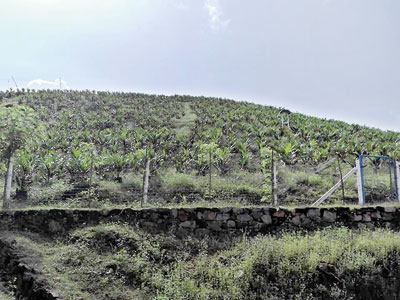News
Cash crop or villain? Palm oil expansion debate rages
“The establishment of new oil palm plantations, expansion and re-plantation should be discontinued in Sri Lanka,” the Central Environment Authority (CEA) has recommended, asking for time to study claimed critical side-effects such as high water usage, soil erosion, high agro-chemical usage and potential destruction of biodiversity.

The protest at Deraniyagala against the expansion of palm oil cultivation
Palm oil, locally known as katupol (“katu” meaning thorny and “pol” meaning palm nut), is in high demand over its popularity as a cooking oil and for a myriad other uses such as the manufacture of soaps, cosmetics, candles, lubricating greases and edible products such as margarine, ice cream, chocolate and bread.
CEA Chairman Chandrarathna Pallegama said measures would be taken to study the impact of established oil palm plantations. “We continue to receive many public complaints related to oil palm cultivation,” he said. “The CEA has been unable to find justifiable reasons for the complaints so a committee of stakeholders has been set up to seek answers to public concerns.”
Depletion of groundwater is the main issue raised with the CEA, and as a result of protests the District Coordinating Committees (DCC) of Galle, Kegalle and Kalutara have decided to temporarily halt new oil palm plantations in their areas.
The latest protest, by villagers at Sapumalkanda, Deraniyagala on June 20, led to tense situations with the protest leaders being assaulted by other factions.
Palm oil (Elaeis guineensis), which is of African origin, was introduced to Sri Lanka in 1967 by the Nakiyadeniya Estate in the Galle District.
A policy decision was taken in 2014 to expand oil palm cultivation on grounds of crop diversification. The plan stipulated that the maximum allowable extent of plantings would be 20,000 ha in marginal, abandoned land and economically unviable land (rubber estates that were more than 30 years old) and that only 20 per cent of such land could be converted to palm oil plantation. This plan is still in operation.
Environmentalist Jayantha Wijesingha fears palm oil could soon replace comparatively eco-friendly rubber.
“Sri Lanka has more than 10 plantation companies involved in oil palm planting to date. Rubber is one of the relatively beneficial plantation crops established in Sri Lanka and any success by the plantation companies to replace rubber, including plans to plant oil palm in more than 10,000 acres of land in the central hills, means imminent destruction [of the environment],” Mr. Wijesingha said.
In Malaysia and Indonesia, the leaders in palm oil cultivation, large areas of primary forest have been cut down to make way for the oil cash crop, causing a huge outcry.
Environmentalist Sajeewa Chamikara of the Movement for Land and Agricultural Reform stressed that Sri Lanka should focus on crops that have local use rather than cash crops aimed at exports. Mr. Chamikara also pointed out that no proper study of the environmental impact of palm oil was carried out before its introduction to Sri Lanka.
Minister of Plantation Industries Navin Dissanayake calls such criticism unscientific and emotional, saying palm oil production would be profitable and save foreign exchange.
Professor Asoka Nugawela of the Faculty of Agriculture at the University of Wayamba also said palm oil has the potential to become a key export and that research was required to stop it being regarded as an enemy. He said many arguments against the crop were baseless and that even justified fears could be effectively mitigated.

A Palm tree plantation
Pointing to the concerns that palm oil cultivation led to severe depletion of water resources, Prof. Nugawela pointed out that the Nakiyadeniya plantation was now more than 50 years old and that no water shortage in the area had been reported.
He also pointed out that global outrage against palm oil was caused by palm oil companies cutting down natural forests and causing biodiversity crises in countries such as Indonesia, whereas in Sri Lanka it was only unproductive and aged rubber land that was being converted to palm oil plantings.
“Most of our plantation crops are naturally found in tropical rainforests. We have domesticated them and established commercial plantations for the benefit of mankind.
“If we select land with suitable climatic and soil conditions and then establish and manage them using good agricultural practices I doubt that these will do harm to the environment. If it is otherwise, that would be the fault of management and not the crop,” Prof. Nugawela said.

